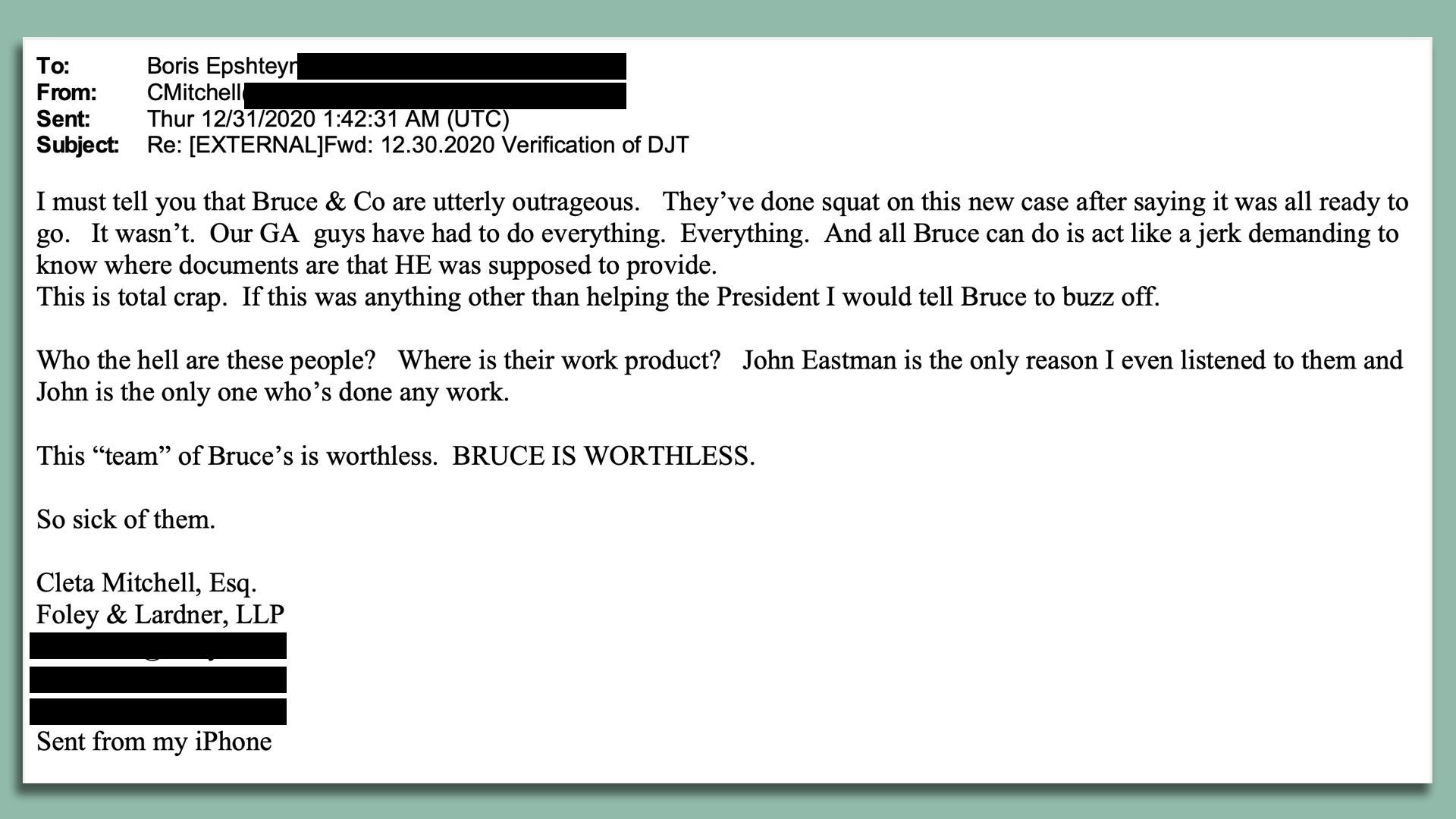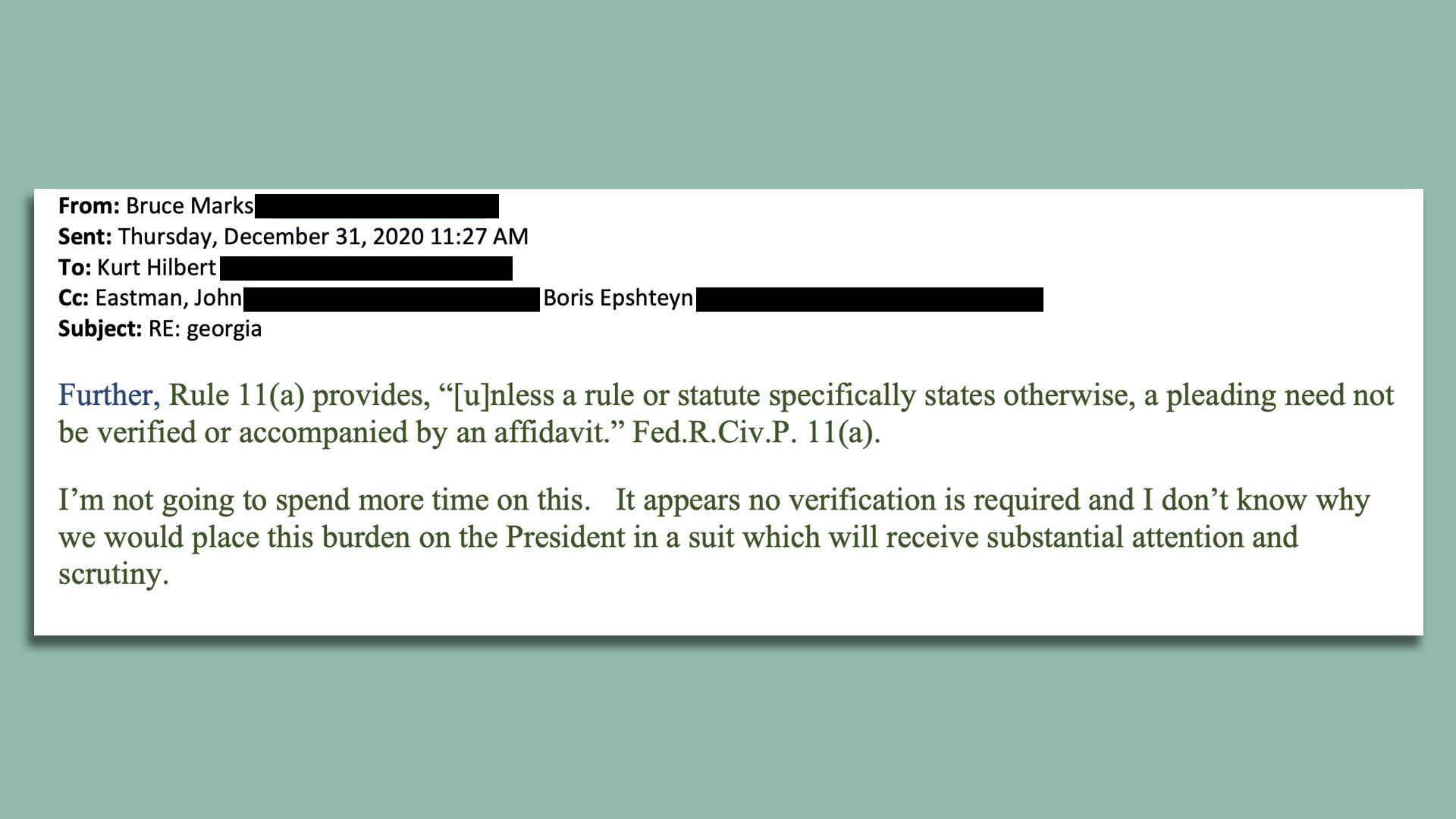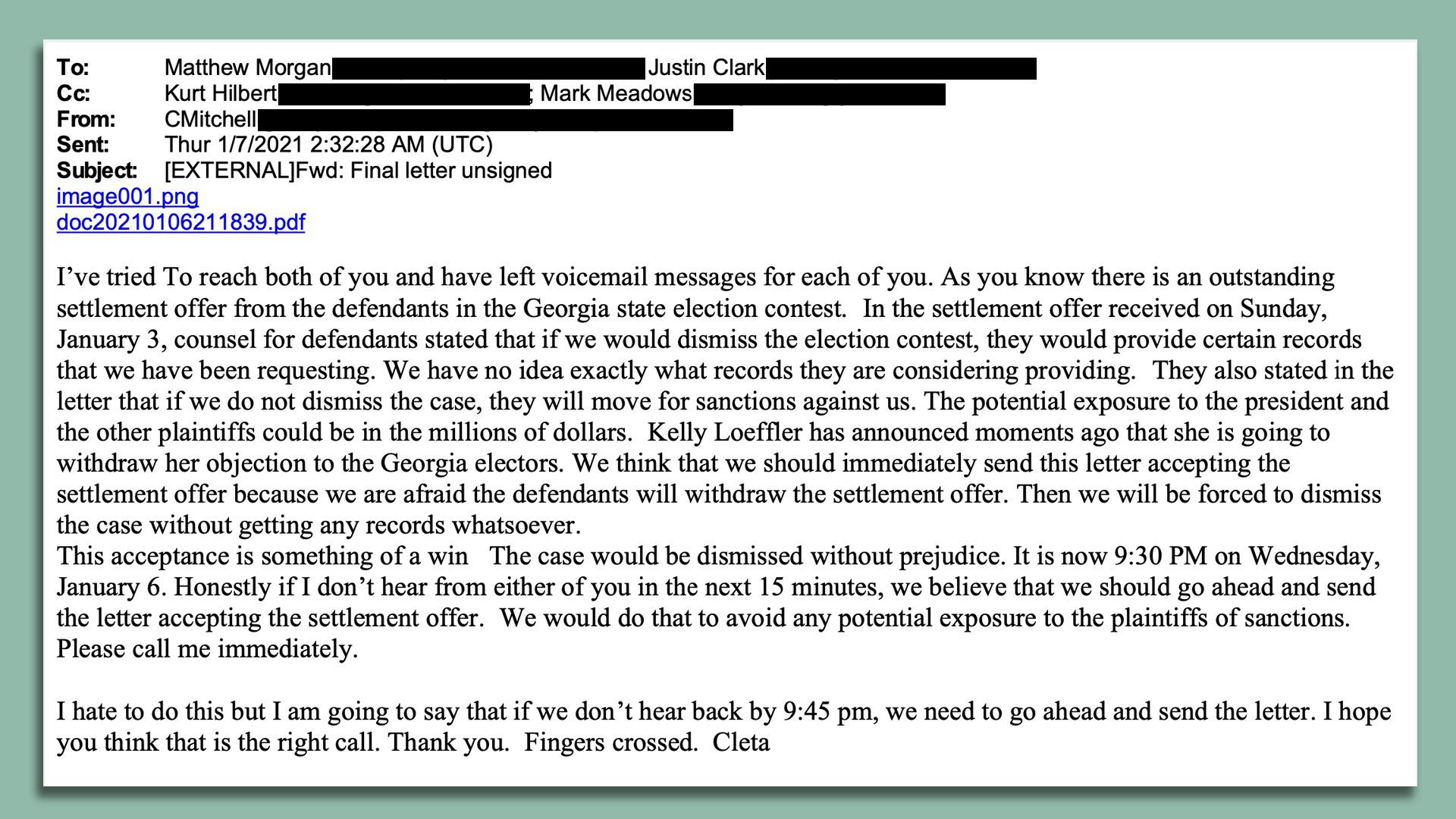Late on the night of Jan. 6, 2021, as the world reeled from the shocking images of a pro-Trump mob ransacking the U.S. Capitol, conservative activist and Trump legal adviser Cleta Mitchell focused her attention elsewhere — on a crumbling voter fraud lawsuit in Georgia that could open the door to criminal exposure.
The big picture: Axios has obtained dozens of previously undisclosed emails from the time period covering Dec. 30, 2020, to Jan. 8, 2021. They shed new light on the internal machinations, pressures and disagreements at the heart of the unprecedented legal battle to keep a defeated president in power.
Why it matters: The central question of what then-President Trump and his lawyers knew when he signed sworn court documents attesting to false evidence of voter fraud in Georgia is now under scrutiny by the Justice Department, Atlanta prosecutors and the House Jan. 6 committee.
- Two lawyers advising Trump were revealed over the past several weeks to have raised concerns about the president signing the verification, which carried the penalty of perjury. The new emails show a third, Bruce Marks, also expressed concern but was overruled.
- The emails also reveal new granularity about the role of Mitchell, who since then has collaborated with the Republican Party to build an activist base of national "election monitors" — many of whom will be out in force in Tuesday's midterms.
Details: The legal discussions on the night of Jan. 6 about Georgia involved Trump himself and consideration of how to minimize exposure from the botched lawsuit and attestation.
- "I spoke with POTUS and he said do the best we can," Mitchell wrote in an email timestamped 9:36 p.m. ET, to Trump campaign lawyers Justin Clark and Matthew Morgan.
- The nation's capital was under citywide curfew. The House and Senate had just resumed debating objections to Joe Biden's Electoral College victory.
- "We are trying to protect all concerned … just wanted to be sure you were in the loop … we will send the letter now," Mitchell wrote.
Context: A federal judge last month ordered John Eastman, a conservative attorney at the center of the scheme to overturn the election, to hand over a batch of emails to the Jan. 6 committee — finding they were "sufficiently related to and in furtherance of a conspiracy to defraud the United States."
- Eastman himself presciently predicted in one email, first reported by Politico: "I have no doubt that an aggressive DA or US Atty someplace will go after both the President and his lawyers once all the dust settles on this."

Frustrations among the warring factions of outside lawyers clinging to Trump and the dream of a second term bubbled to the surface in the dying hours of 2020.
- "I must tell you that Bruce & Co are utterly outrageous," Mitchell sounded off in one furious email to Trump adviser Boris Epshteyn on Dec. 31.
- "They've done squat on this new case after saying it was all ready to go," she wrote, tearing into outside lawyer and decades-long voter fraud campaigner Bruce Marks. "This 'team' of Bruce's is worthless. BRUCE IS WORTHLESS. So sick of them."
- Fifty-four days had passed since the election was called for Joe Biden. In six days, Congress was set to meet to certify Biden's Electoral College victory.
- The army of fringe attorneys and conspiracy theorists that now had the president's ear was growing desperate.
Mitchell’s email to Epshteyn was provoked by a message from Marks the day before, Dec. 30, raising concerns about inconsistencies in the draft motion being prepared for the Georgia challenge — a federal lawsuit against Georgia Gov. Brian Kemp and Georgia Secretary of State Brad Raffensperger.
- Marks had questioned the absence of a supporting memorandum of law in the draft. Mitchell fired back, blaming Marks instead: "This lawsuit is one you guys talked us into doing. So why don't you have a memorandum of law for us already?"
- "Cleta, I am not going to get into emails with you like this. Please stop this," Marks responded.
Behind the scenes: Sources say Mitchell leveraged her connection to White House chief of staff Mark Meadows to exert authority over the patchwork legal team.
- Her bulldozing of Marks, who has made a career out of alleging massive absentee ballot fraud since 1993, may come to bear serious legal consequences for the president and his lawyers.
- On Dec. 31, Marks wrote in an email to Eastman, Epshteyn and Kurt Hilbert — the Mitchell-aligned attorney leading the Georgia lawsuit — that he could find no legal requirement for Trump to personally sign a verification of the claims of voter fraud that would be incorporated as evidence.
- "I don't know why we would place this burden on the President in a suit which will receive substantial attention and scrutiny," Marks argued.
- After a heated back-and-forth with Hilbert, who explained that a verification was needed to seek "equitable relief," Marks eventually relented and said he would "leave this to others to resolve."
- Hilbert and Marks did not respond to requests for comment.

Between the lines: Marks is the third lawyer revealed to have raised concerns about Trump signing the verification for evidence now known to be false.
- Forty-five minutes after Marks' objection, Eastman warned that Trump had been made aware that some of the allegations and evidence of voter fraud used in a previous state-level Georgia election lawsuit were inaccurate, according to emails turned over to the Jan. 6 committee.
- "For him to sign a new verification with that knowledge (and incorporation by reference) would not be accurate," Eastman told Trump lawyer Kenneth Chesebro and outside lawyer Alex Kaufman, adding he was intentionally leaving out Marks and his team.
To protect Trump from responsibility, Hilbert suggested inserting a footnote in the lawsuit that stated the president was only relying on voter data provided to him.
- A satisfied Mitchell pressed ahead and asked Eastman to get the verification approved by senior White House lawyer Eric Herschmann while she searched for a notary to certify Trump's signature via Zoom.
- But a separate batch of emails previously reported by Axios reveals that later that evening, Herschmann told Mitchell and Meadows he was concerned about Trump signing a verification in support of facts that may fall apart under scrutiny.
The bottom line: None of those warnings stopped the verification from being signed and notarized just hours before midnight on New Year's Eve.
- A federal judge later cited Eastman's email warning as evidence Trump "knew that the specific numbers of voter fraud were wrong but continued to tout those numbers, both in court and to the public."
- Both Marks and Herschmann have been subpoenaed in the Justice Department's criminal investigation of the Trump-backed efforts to overturn the election. Federal agents seized Eastman's cellphone in June.
Flash forward: On the night of Jan. 6, as many Americans were still struggling to comprehend the frightening scenes at the nation's Capitol, Mitchell penned a frantic email to the Trump campaign lawyers, Justin Clark and Matthew Morgan.
- "I've tried [to] reach both of you and have left voicemail messages for each of you," Mitchell wrote, as she claimed that Georgia officials were threatening to move for sanctions against the Trump legal team unless they withdrew their lawsuits.
- "The potential exposure to the president and the other plaintiffs could be in the millions of dollars," she warned.

Mitchell had attached a draft letter to Georgia Attorney General Christopher Carr, dated Jan. 6, agreeing to withdraw all of the Trump-backed legal team's Georgia state and federal lawsuits as part of a "settlement" allegedly proposed by Kemp and Raffensperger.
- The letter, drafted by Hilbert, claimed the Georgia officials had agreed to share election data in exchange for the dismissal of the lawsuits. Mitchell painted the alleged settlement as "something of a win" because the Georgia officials "would provide certain records that we have been requesting."
- "We think that we should immediately send this letter accepting the settlement offer because we are afraid the defendants will withdraw the settlement offer. Then we will be forced to dismiss the case without getting any records whatsoever," Mitchell wrote to Morgan and Clark.
- She warned that it was "now 9:30pm" ET on Jan. 6, and that she and Hilbert would be forced to send the letter within 15 minutes if they didn't hear from the campaign. The historic, bloody events of that day had not deterred Mitchell and her team from their focus on false allegations of voter fraud in Georgia.
"Kurt and Cleta, [in] no way do I have authority to sign off on this decision or this letter," Morgan replied.
- Citing a previous email in which Mitchell specifically asserted that she was "in charge of Georgia," Morgan urged her to get sign-off from Trump or Meadows and said the campaign would accept the decision.
- That's when Mitchell dropped her kicker: She had already spoken to Trump — whose mindset and actions on Jan. 6 are at the heart of several criminal investigations — and, according to Mitchell, he had encouraged her to follow her judgment.
- Morgan declined to comment. Spokespeople for Trump did not respond to requests for comment.
- White House call logs obtained by the Washington Post confirm Trump and Mitchell spoke for approximately two minutes at 7:53 p.m. ET. At 9:36 p.m. ET — the very minute that Mitchell replied to the Trump campaign lawyers — Hilbert sent the letter to the Georgia AG's office.
The intrigue: Kemp and Raffensperger ultimately accepted the withdrawal of the lawsuits but disputed that there was ever a formal settlement. "Donald J. Trump voluntarily dismissed this litigation contending the dismissal is a result of settlement between the parties. It is not. There is no 'settlement,'" they stated in court.
- Axios obtained the earlier Jan. 3 letter from Georgia's attorney general that Hilbert and Mitchell were referencing. An outside counsel working with the AG's office had told Hilbert that the allegations in the lawsuit "(1) are factually wrong; (2) are based on improper speculation and faulty data and data analysis; (3) lack substantive legal merit; (4) are moot; and (5) are procedurally deficient."
- The lawyer said the AG's office was "willing to share as much information as we can" regarding election data, but only if the lawsuits were withdrawn. Remarkably, the letter made no reference to a "settlement" or "sanctions," as Mitchell and Hilbert had claimed.
- Instead, it specifically stated that once the litigation was dropped, Hilbert could make an appointment the following day to bring exhibits from the Trump lawsuit and receive a demonstration on why the "proffered evidenced [sic] does not support the conclusions" of their court filings.
- Forwarding the email to Mitchell, Hilbert wrote: "Please give to the President as this is technically an offer to settle."
In court, the Georgia officials also sharply rebuked Hilbert for his involvement in a now-infamous Jan. 2 call in which Trump sought to pressure Raffensperger to "find" enough votes to overturn Biden's election victory.
- Mitchell, Meadows and Kaufman were also on that call. In an email to Trump campaign lawyers on Jan. 8 attempting to secure payment for members of the legal team, Mitchell said Kaufman was forced out of his law firm because of his involvement on the call. "Quite outrageous," she wrote.
- Mitchell abruptly resigned her partnership from the law firm Foley & Lardner after the firm publicly aired concerns about her own involvement in the Jan. 2 phone call.
What's next: Despite these troubles, Mitchell has over the past 18 months redoubled her efforts and established herself as a central player in the nationwide network of Trump-allied lawyers and activists who are laying the groundwork to monitor and contest future elections.
- Mitchell's project, called the "Election Integrity Network," is run out of the Conservative Partnership Institute, an influential Washington, D.C.-based think tank stocked with former senior Trump administration officials.
- In a sign of how important Mitchell's efforts are to Trump, the former president, who is loath to share his PAC's money, authorized a $1 million donation to CPI. This was by far the Trump committee's largest donation to political allies in the second half of 2021.
- Mitchell told Axios in a statement: "Any assertion that we are seeking to overturn future elections is a complete fabrication. There's not a word in any of our materials saying this is about 'overturning elections.' We aren't saying that. We aren't doing that."
Axios' Emma Hurt contributed reporting.







